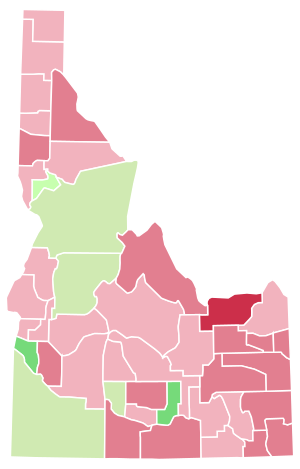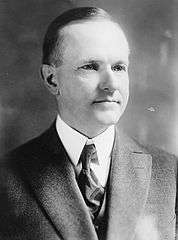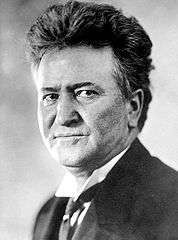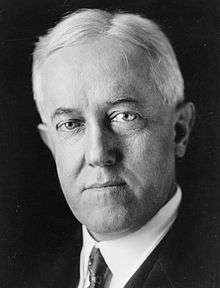1924 United States presidential election in Idaho
The 1924 United States presidential election in Idaho took place on November 4, 1924, as part of the 1924 United States presidential election. State voters chose four representatives, or electors, to the Electoral College, who voted for president and vice president.
| |||||||||||||||||||||||||||||||||
| |||||||||||||||||||||||||||||||||
 County Results
| |||||||||||||||||||||||||||||||||
| |||||||||||||||||||||||||||||||||
| Elections in Idaho | ||||||||
|---|---|---|---|---|---|---|---|---|
 | ||||||||
|
||||||||
|
||||||||
Background
At state level, Idaho had begun in 1902 to be very much a one-party Republican state,[1] which it has largely remained since apart from the New Deal era of the 1930s and 1940s. For a time there was also a perception that the William Jennings Bryan-led Democratic Party had failed as a “party of reform”.[2]
However, with the aid of a powerful “peace vote” due to opposition to participation in World War I,[3] and a considerable part of the substantial vote for Eugene Debs,[4] Woodrow Wilson almost completely swept the Western and Plains States in 1916 (Idaho included), losing only South Dakota and Oregon. These gains were to be lost due to growing anti-Asian and isolationist feelings in the West[5] – James M. Cox in 1920 lost every Idaho county by double digits.
To further marginalize the Democrats, in 1922 “Progressive Party”[lower-alpha 1] nominee H.F. Samuels ran ahead of Democratic candidate and former Governor Moses Alexander.[6]
Primaries
During the pre-election primaries the Democratic Party was divided between a rural, southern and Western wing led by Woodrow Wilson’s son-in-law William Giibs McAdoo, opposed to an urban, immigrant and anti-Prohibition faction in major northern cities.[7] The man who would ultimately represent this urban faction was New York Governor Al Smith, whose Catholic faith was vehemently opposed by many rural Appalachian Democrats.[7] Even in his adopted West, McAdoo was not universally liked because of his links to Edward L. Doheny and Harding’s “Teapot Dome” petroleum scandal;[8] nonetheless there was sufficient hostility in Idaho to Smith that the state’s delegation – alongside others in the West – held a parade for McAdoo at the beginning of the party’s convention in New York City.[9] Delegates in Idaho continued to support McAdoo as the convention remained undecided,[10][11] until the one hundred and first ballot when they finally shifted to former Agriculture Secretary David F. Houston and then to Montana Senator Thomas J. Walsh on the one hundred and second.[12] The one hundred and third ballot saw the Gem State switch to West Virgnian John W. Davis,[12] who won the nomination thereon.
Third-party challenge
The conservatism of Coolidge and Davis resulted in Wisconsin Senator Robert M. La Follette senior mountinf a third-party challenge – which La Follette had planned even before the Democratic Convention.[13] In agricultural western and midwestern states like Idaho, there was widespread discontent with the policies of the incumbent Coolidge Administration, and Idaho became one of La Follette’s primary targets from the start of his campaign with running mate Burton K. Wheeler of Montana.[14] By the end of July the GOP was concerned that La Follette was showing strength in the Gem State,[15] and this fear grew as the election drew nearer.[16] It was always clear Democrat Davis had no chance in this GOP bastion,[17] and this was backed up by polls in the middle of October, which showed Davis running third and that many of the state’s small number of Democrats were backing La Follette.[18]
Thinking he had won most of the West, despite polls actually showing him well behind Coolidge except in his home state, Nevada, and the northern Plains States,[19] La Follette did not campaign in the state during October, preferring to work in the eastern states where he felt he could gain more additional support.[20] In Idaho itself, polls in the four weeks of October showed Coolidge well ahead with around fifty percent of the vote.[21]
Vote
As it turned out, Coolidge actually underperformed the October polls in the Gem State, but still comfortably carried the state by a double-digit margin over La Follette. Coolidge’s strong performance in the conservative, highly Mormon southeast and also in Northern Idaho, whilst La Follette did best in rural areas of the southwest and central mountains, in which he carried eight counties.
Results
| Presidential Candidate | Running Mate | Party | Electoral Vote (EV) | Popular Vote (PV)[22] | |
|---|---|---|---|---|---|
| Calvin Coolidge | Charles G. Dawes | Republican | 4 | 69,879 | 47.12% |
| Robert M. LaFollette | Burton K. Wheeler | Progressive | 0 | 54,160 | 36.52% |
| John W. Davis | Charles W. Bryan | Democratic | 0 | 24,256 | 16.36% |
Results by county
| County | John Calvin Coolidge Republican |
John William Davis Democratic |
Robert Marion La Follette, Sr. Progressive |
Margin[lower-alpha 2] | Total votes cast[23] | ||||
|---|---|---|---|---|---|---|---|---|---|
| # | % | # | % | # | % | # | % | ||
| Ada | 7,220 | 54.47% | 2,255 | 17.01% | 3,780 | 28.52% | 3,440 | 25.95% | 13,255 |
| Adams | 422 | 42.24% | 208 | 20.82% | 369 | 36.94% | 53 | 5.31% | 999 |
| Bannock | 4,520 | 44.99% | 1,612 | 16.05% | 3,914 | 38.96% | 606 | 6.03% | 10,046 |
| Bear Lake | 1,611 | 54.19% | 881 | 29.63% | 481 | 16.18% | 730[lower-alpha 3] | 24.55% | 2,973 |
| Benewah | 1,158 | 46.98% | 318 | 12.90% | 989 | 40.12% | 169 | 6.86% | 2,465 |
| Bingham | 2,693 | 53.45% | 696 | 13.82% | 1,649 | 32.73% | 1,044 | 20.72% | 5,038 |
| Blaine | 732 | 41.59% | 543 | 30.85% | 485 | 27.56% | 189[lower-alpha 3] | 10.74% | 1,760 |
| Boise | 388 | 43.02% | 198 | 21.95% | 316 | 35.03% | 72 | 7.98% | 902 |
| Bonner | 1,714 | 40.19% | 543 | 12.73% | 2,008 | 47.08% | -294 | -6.89% | 4,265 |
| Bonneville | 2,880 | 53.62% | 431 | 8.02% | 2,060 | 38.35% | 820 | 15.27% | 5,371 |
| Boundary | 829 | 46.97% | 244 | 13.82% | 692 | 39.21% | 137 | 7.76% | 1,765 |
| Butte | 409 | 46.01% | 196 | 22.05% | 284 | 31.95% | 125 | 14.06% | 889 |
| Camas | 226 | 35.26% | 113 | 17.63% | 302 | 47.11% | -76 | -11.86% | 641 |
| Canyon | 3,820 | 38.40% | 965 | 9.70% | 5,163 | 51.90% | -1,343 | -13.50% | 9,948 |
| Caribou | 508 | 58.80% | 148 | 17.13% | 208 | 24.07% | 300 | 34.72% | 864 |
| Cassia | 2,031 | 52.01% | 538 | 13.78% | 1,336 | 34.21% | 695 | 17.80% | 3,905 |
| Clark | 496 | 69.47% | 43 | 6.02% | 175 | 24.51% | 321 | 44.96% | 714 |
| Clearwater | 946 | 47.47% | 322 | 16.16% | 725 | 36.38% | 221 | 11.09% | 1,993 |
| Custer | 585 | 45.99% | 394 | 30.97% | 293 | 23.03% | 191[lower-alpha 3] | 15.02% | 1,272 |
| Elmore | 789 | 38.01% | 381 | 18.35% | 906 | 43.64% | -117 | -5.64% | 2,076 |
| Franklin | 1,361 | 51.87% | 540 | 20.58% | 723 | 27.55% | 638 | 24.31% | 2,624 |
| Fremont | 1,662 | 45.30% | 530 | 14.45% | 1,477 | 40.26% | 185 | 5.04% | 3,669 |
| Gem | 1,072 | 41.31% | 380 | 14.64% | 1,143 | 44.05% | -71 | -2.74% | 2,595 |
| Gooding | 1,097 | 45.42% | 422 | 17.47% | 896 | 37.10% | 201 | 8.32% | 2,415 |
| Idaho | 1,363 | 38.17% | 779 | 21.81% | 1,429 | 40.02% | -66 | -1.85% | 3,571 |
| Jefferson | 1,393 | 50.07% | 305 | 10.96% | 1,084 | 38.96% | 309 | 11.11% | 2,782 |
| Jerome | 1,117 | 46.76% | 376 | 15.74% | 896 | 37.51% | 221 | 9.25% | 2,389 |
| Kootenai | 3,289 | 44.84% | 790 | 10.77% | 3,256 | 44.39% | 33 | 0.45% | 7,335 |
| Latah | 3,053 | 52.28% | 838 | 14.35% | 1,949 | 33.37% | 1,104 | 18.90% | 5,840 |
| Lemhi | 1,005 | 54.38% | 442 | 23.92% | 401 | 21.70% | 563[lower-alpha 3] | 30.47% | 1,848 |
| Lewis | 650 | 32.44% | 601 | 29.99% | 753 | 37.57% | -103 | -5.14% | 2,004 |
| Lincoln | 692 | 54.36% | 154 | 12.10% | 427 | 33.54% | 265 | 20.82% | 1,273 |
| Madison | 1,417 | 53.82% | 601 | 22.83% | 615 | 23.36% | 802 | 30.46% | 2,633 |
| Minidoka | 1,046 | 39.92% | 204 | 7.79% | 1,370 | 52.29% | -324 | -12.37% | 2,620 |
| Nez Perce | 2,250 | 42.42% | 1,212 | 22.85% | 1,842 | 34.73% | 408 | 7.69% | 5,304 |
| Oneida | 956 | 42.81% | 530 | 23.73% | 747 | 33.45% | 209 | 9.36% | 2,233 |
| Owyhee | 564 | 36.53% | 309 | 20.01% | 671 | 43.46% | -107 | -6.93% | 1,544 |
| Payette | 1,160 | 47.39% | 401 | 16.38% | 887 | 36.23% | 273 | 11.15% | 2,448 |
| Power | 757 | 43.13% | 314 | 17.89% | 684 | 38.97% | 73 | 4.16% | 1,755 |
| Shoshone | 3,034 | 51.02% | 835 | 14.04% | 2,078 | 34.94% | 956 | 16.08% | 5,947 |
| Teton | 665 | 55.70% | 186 | 15.58% | 343 | 28.73% | 322 | 26.97% | 1,194 |
| Twin Falls | 4,630 | 51.04% | 1,641 | 18.09% | 2,800 | 30.87% | 1,830 | 20.17% | 9,071 |
| Valley | 486 | 40.57% | 214 | 17.86% | 498 | 41.57% | -12 | -1.00% | 1,198 |
| Washington | 1,183 | 41.33% | 623 | 21.77% | 1,056 | 36.90% | 127 | 4.44% | 2,862 |
| Totals | 69,879 | 47.12% | 24,256 | 16.36% | 54,160 | 36.52% | 15,719 | 10.60% | 148,295 |
Notes
- This party was actually allied with the Nonpartisan League prominent in the Dakotas at that time, rather than with the Theodore Roosevelt or La Follette “Progressives”.
- Because La Follette finished ahead of Davis in Idaho as a whole, all margins given are Coolidge vote minus La Follette vote and all percentage margins Coolidge percentage minus La Follette percentage unless otherwise stated for the county in question.
- In this county where Davis did run second ahead of La Follette, margin given is Coolidge vote minus Davis vote and percentage margin Coolidge percentage minus Davis percentage.
References
- Burnham, Walter Dean; ‘The System of 1896’, in Kleppner, Paul (editor), The Evolution of American Electoral Systems, pp. 176-179 ISBN 0313213798
- Robinson, Edgar Eugene; ‘The Decline of the Democratic Party’; American Journal of Sociology, vol. 20, no. 3 (November 1914), pp. 313-334
- Menendez, Albert J.; The Geography of Presidential Elections in the United States, 1868-2004, p. 47 ISBN 0786422173
- Sarasohn, David; 'The Election of 1916: Realigning the Rockies', Western Historical Quarterly, Vol. 11, No. 3 (July 1980), pp. 285-305
- Phillips, Kevin P.; The Emerging Republican Majority, p. 498 ISBN 9780691163246
- Weinstein, James; ‘Radicalism in the Midst of Normalcy’; The Journal of American History, Volume 52, No. 4 (March 1966), pp. 773-790
- Tucker, Garland; High Tide of American Conservatism: Davis, Coolidge, and the 1924 Election, pp. 81-82 ISBN 9781937110291
- Ranson, Edward; ‘“A Snarling Roughhouse”: The Democratic Convention of 1924’; History Today; volume 44, issue 7, (July 1994), pp. 27-33
- ‘Westerners Hold Parade for McAdoo: Californians and Other Groups Demonstrate on Fifth Avenue – Audience Is Cool’; New York Times, June 24, 1924, p. 2
- Henning, Arthur Sears; ‘Vote Four Days with Deadlock: Tight as Ever’; The Chicago Tribune; July 4, 1924, p. 1
- ‘Efforts at Peace Are Fruitless: Smith Polls a New High Vote; McAdoo Sliding’; The Bee, July 5, 1924, p. 1
- ‘How the States Voted’; The Charlotte Observer, July 10, 1924, p. 11
- Richardson, Danny G.; Others: "Fighting Bob" La Follette and the Progressive Movement: Third-Party Politics in the 1920s, p. 180 ISBN 0595481264
- ‘Electoral Arthimetic’; New York Times, July 13, 1924, p. E2
- ‘La Follette Boom Is Scanned by Anxious Eyes’; The Gazette Bedford, PA, July 25, 1924, p. 4
- ‘Republicans Fear La Follette in West: Campaign Leaders Now Consider That His Strength There Is a Menace’; Special to the New York Times, September 15, 1924, p. 1
- ‘Borah Big Factor in Idaho Contest: Politicians Say the Candidate He Endorses Will Carry the State’; Special to the New York Times, October 7, 1924, p. 3
- ‘5 Mountain States Still Uncertain: Neither Republicans Nor Progressives Are Really Confident of the Outcome, but Say Davis Runs Third’; Special to the New York Times, 12 October 1924, p. E1
- ‘Latest Polls in Nationwide Straw Ballot’; The San Francisco Examiner, October 19, 1924, pp. 1, 8
- ‘Senator Drops Plan to Stump Pacific States: La Follette Believes Partisan Contest Will Be Decided in Eastern Territory’; Rochester Democrat and Chronicle, October 19, 1924, p. 2
- “Idaho” in ‘Big Coolidge Lead Held in “Digest” Poll’; San Francisco Examiner, October 24, 1924, p. 9
- "1924 Presidential General Election Results – Idaho". Dave Leip's Atlas of U.S. Presidential Elections. Retrieved 2019-12-30.
- Idaho Secretary of State Election Division; State of Idaho Presidential Vote Cast at the General Election November 4, 1924



